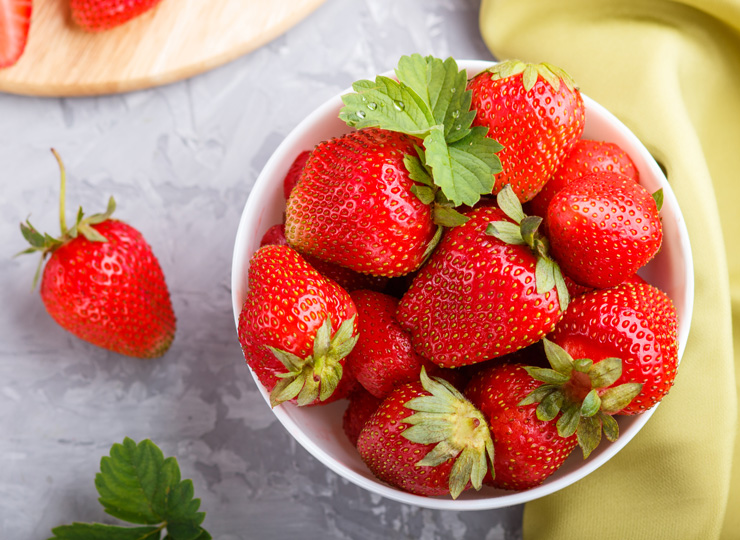
November 15, 2023
More good news on the berry front. A new study found that a daily serving of strawberries led to improvements in some thinking skills in middle-aged men and women with memory complaints.
The findings, from researchers at the University of Cincinnati, build on earlier evidence that various types of berries, including strawberries, blueberries, and cranberries, may be good for the brain. Earlier studies by the researchers found that adding blueberries to the diets of middle-aged men and women lowered their chances of developing Alzheimer’s disease and other forms of dementia. This newest study, published in the journal Nutrients, suggests strawberries may have similar dementia-fighting properties.
“Both strawberries and blueberries contain antioxidants called anthocyanins, which have been implicated in a variety of berry health benefits such as metabolic and cognitive enhancements,” said Robert Krikorian, the study’s lead author and a professor emeritus in the University of Cincinnati College of Medicine’s Department of Psychiatry and Behavioral Neuroscience. “There is epidemiological data suggesting that people who consume strawberries or blueberries regularly have a slower rate of cognitive decline with aging.”
Anthocyanins, natural plant pigments that give berries their red and purple colors, belong to a class of plant nutrients called flavonoids. Flavonoids are powerful antioxidants, which help to neutralize highly reactive oxygen compounds that can damage cells throughout the body, including in the brain. Flavonoids also have inflammation-fighting effects, and increasingly doctors recognize that inflammation plays a critical role in many chronic conditions of age, including Alzheimer’s disease.
Berries contain other healthful nutrients as well, and they and are also high in fiber. A high-fiber diet has been linked to a lower risk of developing Alzheimer’s disease.
For the current study, researchers recruited 30 men and women who ranged in age from 50 to 65. All had complaints that their memories were “slipping,” though none had Alzheimer’s disease or serious forms of memory loss like mild cognitive impairment. The study participants were also overweight, with a body mass index exceeding 25. Excess body weight, especially excess abdominal fat, at midlife increases the risk of developing diabetes as well as dementia.
The volunteers were randomly divided into two groups. Half got a strawberry powder containing the equivalent of about a cup of fresh strawberries that they were told to mix with water during their morning meal each day. The others got a placebo powder that looked and tasted the same, but which did not contain the nutrients present in strawberries. The powders were provided by the California Strawberry Commission, a trade group, though the organization did not have input into the study’s design or interpretation of results.
Over the next 12 weeks, participants in both groups were told to refrain from eating any other berries or berry-containing foods. They could eat plain or vanilla yogurt, for example, but not berry-flavored yogurts.
At the start and end of the study, volunteers were also given tests of memory, problem solving and thinking skills as well as tests to measure mood and symptoms of depression. The memory tests included verbal tasks like being given a list of words to memorize; then, later in the test session, after a series of distractions, being given another list of words and being asked to identify which words were included in the original list.
The tests were designed in part to measure executive function, or the ability to plan and carry out day to day activities and goals. As Alzheimer’s disease progresses, it typically causes severe impairments in executive function, making it difficult for people with the disease to perform activities of daily living like preparing meals or getting dressed.
The researchers found that the men and women who were given the strawberry powder showed improvements in the verbal learning and memory test, implying better executive function. Those in the placebo group did not show similar improvements. Those in the strawberry group also scored higher in mood tests, with fewer signs of depression. Dr. Krikorian said the “enhanced executive ability” in the strawberry group might “provide better emotional control and coping” and perhaps result in “better problem-solving” skills.
“Executive abilities begin to decline in midlife, and excess abdominal fat, as in insulin resistance and obesity, will tend to increase inflammation, including in the brain,” said Dr. Krikorian. “So, one might consider that our middle-aged, overweight, prediabetic sample had higher levels of inflammation that contributed to at least mild impairment of executive abilities. Accordingly, the beneficial effects we observed might be related to moderation of inflammation in the strawberry group.”
The study was small, and larger studies are needed to further assess the role of specific foods and nutrients in long-term brain health. But experts say that eating a rich variety of colorful fruits and vegetables, rather than any one food, may have the greatest benefits for brain health, and the body’s health in general.
And it may not take much. Other studies have shown that a few servings of berries a week, a glass of orange juice, maybe an apple or two may be all it takes to help keep the memory sharp into old age.
By ALZinfo.org, The Alzheimer’s Information Site. Reviewed by Eric Schmidt, Ph.D., Fisher Center for Alzheimer’s Research Foundation at The Rockefeller University.
Source: Robert Krikorian, Marcelle D. Shidler, Suzanne S. Summer: “Early Intervention in Cognitive Aging with Strawberry Supplementation.” Nutrients, October 19, 2023











